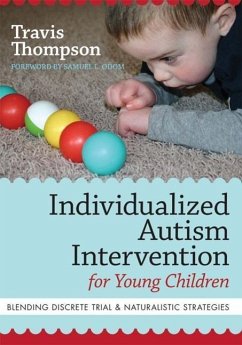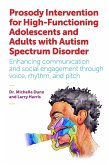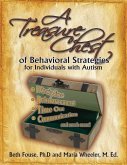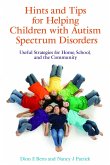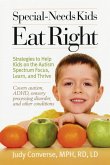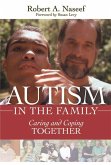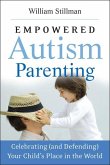Travis Thompson
Individualized Autism Intervention for Young Children
Blending Discrete Trial and Naturalistic Strategies
Travis Thompson
Individualized Autism Intervention for Young Children
Blending Discrete Trial and Naturalistic Strategies
- Broschiertes Buch
- Merkliste
- Auf die Merkliste
- Bewerten Bewerten
- Teilen
- Produkt teilen
- Produkterinnerung
- Produkterinnerung
Discrete trial instruction or naturalistic, incidental teaching: How do you choose which approach to use with young children with autism? There's no need to ""pick a side""—this groundbreaking book helps professionals skillfully blend the best of both behavioural approaches to respond to each child's individual needs. Developed an expert on autism, this innovative, evidence-based guidebook cuts through the chaos of conflicting information and gives readers a logical, child-centred way to plan and implement intervention.
Andere Kunden interessierten sich auch für
![Prosody Intervention for High-Functioning Adolescents and Adults with Autism Spectrum Disorder: Enhancing Communication and Social Engagement Through Prosody Intervention for High-Functioning Adolescents and Adults with Autism Spectrum Disorder: Enhancing Communication and Social Engagement Through]() Michelle DunnProsody Intervention for High-Functioning Adolescents and Adults with Autism Spectrum Disorder: Enhancing Communication and Social Engagement Through43,99 €
Michelle DunnProsody Intervention for High-Functioning Adolescents and Adults with Autism Spectrum Disorder: Enhancing Communication and Social Engagement Through43,99 €![A Treasure Chest of Behavioral Strategies for Individuals with Autism A Treasure Chest of Behavioral Strategies for Individuals with Autism]() Beth FouseA Treasure Chest of Behavioral Strategies for Individuals with Autism33,99 €
Beth FouseA Treasure Chest of Behavioral Strategies for Individuals with Autism33,99 €![Hints and Tips for Helping Children with Autism Spectrum Disorders: Useful Strategies for Home, School, and the Community Hints and Tips for Helping Children with Autism Spectrum Disorders: Useful Strategies for Home, School, and the Community]() Dion BettsHints and Tips for Helping Children with Autism Spectrum Disorders: Useful Strategies for Home, School, and the Community25,99 €
Dion BettsHints and Tips for Helping Children with Autism Spectrum Disorders: Useful Strategies for Home, School, and the Community25,99 €![Special-Needs Kids Eat Right Special-Needs Kids Eat Right]() Judy ConverseSpecial-Needs Kids Eat Right22,99 €
Judy ConverseSpecial-Needs Kids Eat Right22,99 €![Autism in the Family Autism in the Family]() Robert NaseefAutism in the Family28,99 €
Robert NaseefAutism in the Family28,99 €![Mother Warriors Mother Warriors]() Jenny MccarthyMother Warriors14,99 €
Jenny MccarthyMother Warriors14,99 €![Empowered Autism Parenting Empowered Autism Parenting]() William StillmanEmpowered Autism Parenting15,99 €
William StillmanEmpowered Autism Parenting15,99 €-
-
-
Discrete trial instruction or naturalistic, incidental teaching: How do you choose which approach to use with young children with autism? There's no need to ""pick a side""—this groundbreaking book helps professionals skillfully blend the best of both behavioural approaches to respond to each child's individual needs. Developed an expert on autism, this innovative, evidence-based guidebook cuts through the chaos of conflicting information and gives readers a logical, child-centred way to plan and implement intervention.
Produktdetails
- Produktdetails
- Verlag: Brookes Publishing Company
- Seitenzahl: 208
- Erscheinungstermin: 7. April 2011
- Englisch
- Abmessung: 251mm x 178mm x 15mm
- Gewicht: 363g
- ISBN-13: 9781598571738
- ISBN-10: 1598571737
- Artikelnr.: 33321242
- Verlag: Brookes Publishing Company
- Seitenzahl: 208
- Erscheinungstermin: 7. April 2011
- Englisch
- Abmessung: 251mm x 178mm x 15mm
- Gewicht: 363g
- ISBN-13: 9781598571738
- ISBN-10: 1598571737
- Artikelnr.: 33321242
Travis Thompson, Ph.D., L.P., Graduate Faculty Member, Special Education Program, Department of Educational Psychology, University of Minnesota, Minneapolis, and Consulting Psychologist, Minnesota Early Autism Project, 7242 Forestview Lane North, Maple Grove, Minnesota 55369 Dr. Thompson is affiliated with the Autism Certificate Program in the Special Education Program of the Department of Educational Psychology at the University of Minnesota, and he is Adjunct Professor in the Department of Applied Behavioral Science at the University of Kansas, Lawrence. He is a collaborator on a multisite project on challenging behavior in developmental disabilities including the Kennedy Krieger Institute in Maryland; the Eunice Kennedy Shriver Center, University of Massachusetts, Amherst; and the University of Kansas, Parsons. He is a licensed psychologist. Dr. Thompson completed his doctoral training in psychology at the University of Minnesota and completed postdoctoral work at the University of Maryland. He spent a year at Cambridge University in the United Kingdom and a year as a visiting scientist at the National Institute on Drug Abuse in Rockville, Maryland. Dr. Thompson was Director of the John F. Kennedy Center for Research on Human Development at Vanderbilt University and Director of the Institute for Child Development at the University of Kansas Medical Center--a clinical, training, and research institute. Dr. Thompson has served on several National Institutes of Health research review committees, including chairing reviews of the applicants for Collaborative Programs of Excellence in Autism awards in 2000, 2003, and 2007. He has been a member of American Psychological Association (APA) task forces concerned with the practice of psychology and psychopharmacology. He is a past president of the Behavioral Pharmacology Society, the Division of Psychopharmacology and Substance Abuse, and the Division of Mental Retardation and Developmental Disabilities of the APA. Dr. Thompson has received numerous awards, including the Distinguished Research Award, The Arc of the United States; the Academy on Mental Retardation Lifetime Research Award; the APA's Don Hake Award; the Edgar A. Doll Award, for contributions to facilitate the transfer of research into practice; and the Ernest R. Hilgard Award and the Impact of Science on Application Award of the Society for Advancement of Behavior Analysis. He has served as cochair of the Association for Behavior Analysis International's Annual Autism Conference (2010 and 2011). He has published more than 230 journal articles and chapters and 30 books dealing with autism, developmental disabilities, psychopharmacology, and related topics. His most recent books, Making Sense of Autism (2007) and Dr. Thompson's Straight Talk on Autism (2008), are also published by Paul H. Brookes Publishing Co. Dr. Thompson has spoken in 46 states and 15 countries about his research and clinical services and on topics related to autism and other developmental disabilities and psychopharmacology. Samuel L. Odom, Ph.D., is the former Director of the Frank Porter Graham (FPG) Child Development Institute where he remains as a Senior Research Scientist. Prior to his work at The University of North Carolina at Chapel Hill, Dr. Odom served in faculty positions at Indiana University and Peabody College/Vanderbilt University. Dr. Odom received a master's degree in special education in 1976 and an educational specialist degree in educational psychology from the University of Tennessee at Knoxville in 1979. He earned his doctorate in 1982 in education and human development from the University of Washington. Throughout his career, Dr. Odom has held positions as a preschool teacher, student teaching supervisor, program coordinator, teacher educator, and researcher. Dr. Odom's research interests include interventions and teaching approaches that promote social competence of young children, effective intervention approaches for children with autism, and early childhood curricula that promote children's school success. He is the author or co-author of over 175 journal articles and book chapters and has edited 10 books on early childhood intervention and developmental disabilities. His current research is addressing treatment efficacy for children and youth with ASD in elementary and high school grades. Also, he is the Co-Director of the National Clearinghouse on Autism Evidence and Practice at FPG. Dr. Odom is an associate editor for Exceptional Children and is on the editorial board of Journal of Early Intervention, Topics in Early Childhood Special Education, Journal of Autism and Developmental Disabilities, and Early Childhood Research Quarterly. He received the Special Education Outstanding Research Award from the American Educational Research Association Special Education Special Interest Group in 1999, the Merle Karnes Contribution to the Field Award from the Division for Early Childhood of the Council for Exceptional Children (CEC) in 2001, and the Outstanding Special Education Research Award from CEC in 2007. In 2013, he received the Arnold Lucius Gesell Prize awarded for career achievement in research on social inclusion and child development from the Theordor Hellbrugge Foundation in Munich, Germany. In 2016, he received an honorary doctoral degree from Stockholm University. He is currently a visiting professor at Stockholm University and San Diego State University.

